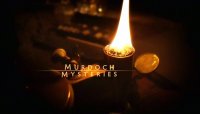 Nothing is so likely to lure me to the television set as a good, short mystery. Fortunately or unfortunately, Netflix has a goodly assortment of the same. Lately, our queue has been filled with an offering from Canadian TV, Murdoch Mysteries. The still-running show is based on the books of Maureen Jennings; I've placed a hold at our library for the first of her tales of Detective William Murdoch, hoping to find them an improvement over the filmed version.
Nothing is so likely to lure me to the television set as a good, short mystery. Fortunately or unfortunately, Netflix has a goodly assortment of the same. Lately, our queue has been filled with an offering from Canadian TV, Murdoch Mysteries. The still-running show is based on the books of Maureen Jennings; I've placed a hold at our library for the first of her tales of Detective William Murdoch, hoping to find them an improvement over the filmed version.
Not that the shows aren't enjoyable—if they weren't, we wouldn't be into the third season now. The premise is interesting: Murdoch is a police detective in 1890's Toronto who solves his cases using scientific methods and equipment that are unknown, little used, or even not quite invented yet. Think CSI: Victorian Toronto.
What causes the fingernails-on-the-blackboard feeling is that, while slightly advancing scientific knowledge for the time period, the show greatly advances the main characters' social attitudes. Be it feminism, abortion, homosexuality, birth control, dating behavior, the church, business practices, or government agents, the setting may be the late 19th century, but the attitudes of the main characters are pure 21st century Hollywood.
You can only push the audience's credulity so far. If you ask them to accept one unrealistic premise, the rest of your story should be believable. J. R. R. Tolkien peopled his created world with fantastic creatures—but they thought, spoke, and acted in familiar ways that we could understand. (That's one of the quarrels I have with the movies—I find them less believable than the books—but that's another post.) J. K. Rowling had no difficulty getting us to accept a world of magic because Hogwarts was otherwise (I assume) a typical British boarding school. (Where it wasn't, the discontinuity was glaring. I still haven't gotten over a British boy describing something as "the size of a baseball bat.")
I'll accept a Toronto police detective using x-ray photography, but I can't swallow a supposedly devout Victorian-era Catholic seriously pursuing a romantic relationship with a non-Catholic, and one with strident anti-Catholic attitudes at that. And I choke every time a character says to a victim's loved one, "I'm sorry for your loss." I don't know exactly when that expression became commonplace, but it was within my lifetime. We've learned to live with the frequent anachronisms, but they diminish the show's credibility.
My favorite character is Constable George Crabtree (played by Jonny Harris), supposedly naive and somewhat dim-witted, but often smarter, and certainly more likeable, than the rest.
The mysteries themselves are inconsistent: some so ridiculous we're certain they cut out important scenes to save time, some very clever with more unexpected twists than an Olympic gymnast.
But what I really like is the music, especially the theme song, and the opening credits. Composer Robert Carli has made the most creative use of percussion (think percussion toys and "bells" in all forms) and percussion-like instrumentation (e.g. pizzicato strings) that I can remember. There's also an artistic flair to the colors and the lettering of the credits that appeals to me. You can get a taste of it here. But only a taste, because for some reason the action of the video seems sped up, which takes away from its elegance.
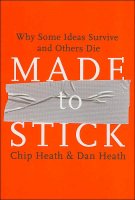 Made to Stick: Why Some Ideas Survive and Others Die by Chip Heath and Dan Heath (Random House, 2007)
Made to Stick: Why Some Ideas Survive and Others Die by Chip Heath and Dan Heath (Random House, 2007)
Can you hear me now? Can you hear me now? Can you hear me now?
Everyone who speaks wants his ideas to get across, be memorable, and have the desired impact on the listener. But more often than not we thrash around like a baby in the throes of learning to crawl: lots of action, no progress.
Before Switch, the Heath brothers wrote Made to Stick. Like its successor, there is too much in this book to apprehend adequately in one reading. At least for me: I read as cows eat, and often need a second go-round to get full benefit from a book. I found Switch more eye-opening and more immediately applicable, but Made to Stick is at least as important. Even if you don't think you need any help communicating your ideas, you need to be aware of the techniques other people are using to get you to accept and remember theirs. You can bet this book is must reading for anyone in the advertising business! And even those with more laudable goals in mind than persuading you to buy their products have been known to use these techniques to promote ideas that are not necessarily correct or helpful.
You can read the first chapter on the authors' website. Here's an excerpt that covers the basic premises, followed by a few passages that particularly struck me.
PRINCIPLE 1: SIMPLICITY
How do we find the essential core of our ideas? A successful defense lawyer says, "If you argue ten points, even if each is a good point, when they get back to the jury room they won't remember any." To strip an idea down to its core, we must be masters of exclusion. We must relentlessly prioritize. Saying something short is not the mission—sound bites are not the ideal. Proverbs are the ideal. We must create ideas that are both simple and profound. The Golden Rule is the ultimate model of simplicity: a one-sentence statement so profound that an individual could spend a lifetime learning to follow it.PRINCIPLE 2: UNEXPECTEDNESS
How do we get our audience to pay attention to our ideas, and how do we maintain their interest when we need time to get the ideas across? We need to violate people's expectations. We need to be counterintuitive. A bag of popcorn is as unhealthy as a whole day's worth of fatty foods! We can use surprise—an emotion whose function is to increase alertness and cause focus—to grab people's attention. But surprise doesn't last. For our idea to endure, we must generate interest and curiosity. How do you keep students engaged during the forty-eighth history class of the year? We can engage people's curiosity over a long period of time by systematically "opening gaps" in their knowledge—and then filling those gaps.PRINCIPLE 3: CONCRETENESS
How do we make our ideas clear? We must explain our ideas in terms of human actions, in terms of sensory information. This is where so much business communication goes awry. Mission statements, synergies, strategies, visions—they are often ambiguous to the point of being meaningless. Naturally sticky ideas are full of concrete images—ice-filled bathtubs, apples with razors—because our brains are wired to remember concrete data. In proverbs, abstract truths are often encoded in concrete language: "A bird in hand is worth two in the bush." Speaking concretely is the only way to ensure that our idea will mean the same thing to everyone in our audience.PRINCIPLE 4: CREDIBILITY
How do we make people believe our ideas? When the former surgeon general C. Everett Koop talks about a public-health issue, most people accept his ideas without skepticism. But in most day-to-day situations we don't enjoy this authority. Sticky ideas have to carry their own credentials. We need ways to help people test our ideas for themselves—a "try before you buy" philosophy for the world of ideas. When we're trying to build a case for something, most of us instinctively grasp for hard numbers. But in many cases this is exactly the wrong approach. In the sole U.S. presidential debate in 1980 between Ronald Reagan and Jimmy Carter, Reagan could have cited innumerable statistics demonstrating the sluggishness of the economy. Instead, he asked a simple question that allowed voters to test for themselves: "Before you vote, ask yourself if you are better off today than you were four years ago."PRINCIPLE 5: EMOTIONS
How do we get people to care about our ideas? We make them feel something. In the case of movie popcorn, we make them feel disgusted by its unhealthiness. The statistic "37 grams" doesn't elicit any emotions. Research shows that people are more likely to make a charitable gift to a single needy individual than to an entire impoverished region. We are wired to feel things for people, not for abstractions. Sometimes the hard part is finding the right emotion to harness. For instance, it's difficult to get teenagers to quit smoking by instilling in them a fear of the consequences, but it's easier to get them to quit by tapping into their resentment of the duplicity of Big Tobacco.PRINCIPLE 6: STORIES
How do we get people to act on our ideas? We tell stories. Firefighters naturally swap stories after every fire, and by doing so they multiply their experience; after years of hearing stories, they have a richer, more complete mental catalog of critical situations they might confront during a fire and the appropriate responses to those situations. Research shows that mentally rehearsing a situation helps us perform better when we encounter that situation in the physical environment. Similarly, hearing stories acts as a kind of mental flight simulator, preparing us to respond more quickly and effectively.
 Last night we attended a very enjoyable performance of The Pirates of Penzance, proceeds of which were earmarked for a much-needed upgrade to the sound system at the Lake Brantley High School auditorium. Our choir director and several people from our church were involved. We almost joined the chorus, but demured after remembering that being involved in a theatrical performance is synonymous with having no outside life. Daily rehearsals were more than we could handle. Still, I regret somewhat losing the opportunity to be able to say that every member of our family had sat, however briefly, under the direction of Cindy Berry.
Last night we attended a very enjoyable performance of The Pirates of Penzance, proceeds of which were earmarked for a much-needed upgrade to the sound system at the Lake Brantley High School auditorium. Our choir director and several people from our church were involved. We almost joined the chorus, but demured after remembering that being involved in a theatrical performance is synonymous with having no outside life. Daily rehearsals were more than we could handle. Still, I regret somewhat losing the opportunity to be able to say that every member of our family had sat, however briefly, under the direction of Cindy Berry.
The show was great! Everyone from the principals (local arts educators) to the middle-school policemen did wonderfully well. The Pirate King was played by Christopher McCabe, Brantley alumnus and now the theater director at a local private school. (I believe he was a freshman when Janet was a senior and no longer spending much time on campus, so don't wrack your brains trying to remember him.) If his performance owed just a little too much to Johnny Depp, that didn't stop him from stealing the show.
Pour, oh pour the pirate sherry, fill, oh fill the pirate glass—and raise it in a toast to Joyce K., who taught us to love Gilbert & Sullivan.
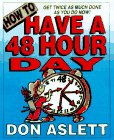 How to Have a 48-Hour Day by Don Aslett (Marsh Creek Press, 1996)
How to Have a 48-Hour Day by Don Aslett (Marsh Creek Press, 1996)
I've always found Don Aslett's books inspiring, and I first read and reviewed this one over ten years ago. This week I decided it was about time for a re-read, especially since I was looking for something quick, easy, and not too mentally challenging.
I found it more challenging this time than last. Not mentally, but emotionally. I didn't really want to hear, "Just suck it up and work harder," which is how the message struck me this time. I found it less inspiring than discouraging, and thus easier to quarrel with some of his premises and logic. On the other hand, I recognize that there's still a lot of wisdom in the book, so instead of picking it apart, I'll reproduce my original review:
“If you want to get something done, ask a busy person.” How to Have a 48–Hour Day explains why this saying is true. If you’re looking for a book that suggests you can accomplish more by doing less, you will be disappointed: This is like one of those tiresome diet books that tell you the only way to lose weight is to eat less and exercise more.
As he does in many of his other books, Aslett tells us things that we already know, but in such a way that we believe them. He provides no great revelation, no fancy organizational system. Instead, he dresses up wisdom in an entertaining, inspirational package. A few of his suggestions—such as cutting back on sleep—go too far, but most represent sound, common sense.
- It’s good, not bad, to be productive. People who get things done generally find that success, happiness, confidence, respect, motivation, options, influence, and security follow.
- The measure of productivity is not how hard you work, nor how busy you are, but what you actually accomplish.
- To do more, first do less. Get rid of unnecessary and unhelpful possessions, activities, relationships, habits, distractions, interruptions, and worries that clutter your life and divert your time and attention from what is important.
- Determine your direction. From ethical values to career goals to family relationships, knowing where you are going makes it possible to set priorities and think clearly when you come to a crossroads.
- Realize that you are going to have to learn to work within the time you have. Finding a large block of time in which you can catch up is about as likely as getting out of debt by winning the lottery.
- BE EARLY. This is his most important point. Work ahead, not behind. Keep a “frontlog”—a list of things to do ahead—rather than a backlog. Being early eliminates deadline stress, allows for more options, and reduces the chance that you will be derailed by unexpected problems.
- Keep many irons in the fire; be working on a variety of projects simultaneously. As long as you’re working well on a particular project, keep going. When your interest and concentration wane, “jump ship” to another project. If you have a large “to do” list and are working ahead instead of behind, you can work at your peak for each job, and rest by doing different work, rather than stopping. As a side benefit, your subconscious often continues to work on the previous project after you’ve switched, so you may find additional insights when you return. With many goals to work toward, you can always be making progress even if you run in to an obstacle or find yourself in a slump.
- Keep your schedule flexible. If you tie yourself down too rigidly, you won’t be able to “go with the flow” and work at your peak.
- Take work with you wherever you go, so you can take advantage of travel and waiting time.
- Use time fragments. Many small moments add up to much time either used productively or wasted.
- Avoid overkill. It’s counterproductive to do more when less is enough.
- Do it now, perfect it later. Don’t wait till your product (project) is “perfect” to get it out into the real world. You’ll profit from the feedback.
- Getting started is the hardest part of a job, so make it easier. Keep your tools and projects handy, lay out your clothes the night before, make sure the car is filled with gas, straighten the mess in the evening rather than leaving it for the next day.
- Don’t wait to be in the right mood to get started. Get moving, and the right mood will usually follow.
- Don’t allow low–fuel jobs to burn high–fuel time. Do your hard work during your most productive times, and save the easy work for when your energy is low.
- Keep spares on hand—tools, supplies, cash. You don’t want to interrupt something important to run to the store.
- Practice preventive maintenance. It takes less time and trouble to repair things before they actually break.
- Observe productive people and learn from them.
- Be at peace with the people in your life. Disharmony wastes much time and energy.
- Learn to love work. Good work is healthier and more rewarding than most so–called recreation. Working around and with your family and friends builds better relationships than most leisure activities.
The last, I believe, is the key to Aslett’s success. He really enjoys what he is doing. I’m sure it helps that he is self–employed. He has been accused of being a workaholic, of never taking time to “smell the roses.” When you love your work, the division between work and the rest of life blurs, as we discovered with homeschooling. School was never “out”; there was no distinction between “school” and “fun.” There was just life, and life was both education and recreation. Don Aslett would add that roses smell far sweeter if you’ve labored to grow them yourself.
On my recent reading, the advice that struck me as the most valuable is the one I emphasized in my review: BE EARLY. No, I don't mean arrive at a dinner party half an hour before the time on the invitation, to the horror of you hosts! (If the weather or traffic is iffy, however, it might be good to arrive early, and hang out a block down the street until the proper time.) Janet's oboe professor taught me the value of that: you'll never be late if you plan to be sufficiently early, and there's always something productive you can do to fill the extra time.
This goes against my grain. I'm always trying to squeeze in one more job before leaving for somewhere. It looks productive, but tends to make me late, as everything takes longer than expected. At the very least, it makes me impatient with red lights and traffic. Why not leave early instead, and if you have extra time once you've arrived, find a nice place to read a book, or write a letter. Aslett advises always carrying work with you, so you'll be able to be productive while waiting. (If you're me, though, you'll need to set an alarm, or you'll be so caught up in what you're doing you'll end up late to the event after all.)
There are many more applications of Be Early, and I'd be a happier and less-stressed person if I made them into habits. Do you need to mow the lawn before your trip? Don't wait till the day before you leave. Are you having company for dinner? Get your shopping done days early. Houseguests coming? Get those boxes off the guest bed now, not as they're pulling into the driveway. Because you never know what distraction—good or bad—might come up and derail your timetable. Your mowing plans might get rained out, the store might be out of a key ingredient, your guests might arrive early, you might make an unexpected trip to the emergency room, a friend you haven't heard from in months might call you on the phone.... It takes no more time—and sometimes much less—to do a job early, and then you can rest in the knowledge that you are prepared.
Good advice. I hope that when I re-read How to Have a 48-Hour Day in another ten years, I'll be able to say, "I've been practicing EARLY for a decade!"

In the Name of Jesus by Henri J. M. Nouwen (Crossroad Publishing 1996; original copyright 1989)
Spiritual Formation: Following the Movements of the Spirit by Henri J. M. Nouwen, with Michael J. Christensen and Rebecca J. Laird (HarperOne, 2010)
I've dabbled in Henri Nouwen's writings for years, always finding value in some of his insights, but never finding myself in a position to appreciate, or even to understand, his work over all. Wherever he is, I'm never "quite there yet." These books evoked the same reaction.
Of the two, In the Name of Jesus I found most comprehensible. Spiritual Formation, a compilation of Nouwen's thoughts, has rough edges from the cut-and-paste effort. It's meant to be a seamless whole, but I encountered too many unacknowledged contradictions to make sense of it all.
Here are a few quotations, all from In the Name of Jesus, which deals with spiritual leadership.
Dealing with burning issues without being rooted in a deep personal relationship with God easily leads to divisiveness because, before we know it, our sense of self is caught up in our opinion about a given subject. But when we are securely rooted in personal intimacy with the source of life, it will be possible to remain flexible without being relativistic, convinced without being rigid, willing to confront without being offensive, gentle and forgiving without being soft, and true witnesses without being manipulative.
When you look at today's Church, it is easy to see the prevalence of individualism among ministers and priests. Not too many of us have a vast repertoire of skills to be proud of, but most of us still feel that, if we have anything at all to show, it is something we have to do solo. You could say that many of us feel like failed tightrope walkers who discovered that we did not have the power to draw thousands of people, that we could not make many conversions, that we did not have the talents to create beautiful liturgies, that we were not as popular with the youth, the young adults, or the elderly as we had hoped, and that we were not as able to respond to the needs of our people as we had expected. But most of us still feel that, ideally, we should have been able to do it all and do it successfully. Stardom and individual heroism, which are such obvious aspects of our competitive society, are not at all alien to the Church. There too the dominant image is that of the self-made man or woman who can do it all alone.
Somehow we have come to believe that good leadership requires a safe distance from those we are called to lead. Medicine, psychiatry, and social work all offer us models in which "service" takes place in a one-way direction. Someone serves, someone else is being served, and be sure not to mix up the roles! But how can anyone lay down his life for those with whom he is not even allowed to enter into a deep personal relationship? Laying down your life means making your own faith and doubt, hope and despair, joy and sadness, courage and fear available to others as ways of getting in touch with the Lord of life.
The temptation to consider power an apt instrument for the proclamation of the Gospel is the greatest of all. ... Every time we see a major crisis in the history of the Church, such as the Great Schism of the eleventh century, the Reformation of the sixteenth century, or the immense secularization of the twentieth century, we always see that a major cause of rupture is the power exercised by those who claim to be followers of the poor and powerless Jesus.
What makes the temptation of power so seemingly irresistible? Maybe it is that power offers an easy substitute for the hard task of love. It seems easier to be God than to love God, easier to control people than to love people, easier to own life than to love life. Jesus asks, "Do you love me?" We ask, "Can we sit at your right hand and your left hand in you Kingdom?" (Matthew 20:21).
[Christian leadership in the future] is not a leadership of power and control, but a leadership of powerlessness and humility in which the suffering servant of God, Jesus Christ, is made manifest. I, obviously, am not speaking about a psychologically weak leadership in which the Christian leader is simply the passive victim of the manipulations of his milieu. No, I am speaking of a leadership in which power is constantly abandoned in favor of love. It is a true spiritual leadership. Powerlessness and humility in the spiritual life do not refer to people who have no spine and who let everyone else make decisions for them. They refer to people who are so deeply in love with Jesus that they are ready to follow him wherever he guides them, always trusting that, with him, they will find life and find it abundantly.
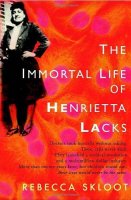 The Immortal Life of Henrietta Lacks by Rebecca Skloot (Broadway Paperbacks, 2011)
The Immortal Life of Henrietta Lacks by Rebecca Skloot (Broadway Paperbacks, 2011)
I was a kid who'd failed freshman year at the regular public high school because she never showed up. I'd transferred to an alternative school that offered dream studies instead of biology, so I was taking [a community college biology class] for high-school credit, which meant that I was sitting in a college lecture hall at sixteen with words like mitosis and kinase inhibitors flying around. I was completely lost.
But it was in that biology class that Rebecca Skloot first heard the name: Henrietta Lacks.
Henrietta died in 1951 from a vicious case of cervical cancer. ... But before she died, a surgeon took samples of her tumor and put them in a petri dish. Scientists had been striving to keep human cells alive in culture for decades, but they all eventually died. Henrietta's were different: they reproduced an entire generation every twenty-four hours, and they never stopped. They became the first immortal human cells ever grown in a laboratory.
By the mid-1970's, when I was working in the University of Rochester's Analytical Cytology Laboratory, the HeLa cell line, as it was called, had been a standard research tool for over 20 years.
[The] cells were part of research into the genes that cause cancer and those that suppress it; they helped develop drugs for treating herpes, leukemia, influenza, hemophilia, and Parkinson's disease; and they'd been used to study lactose digestion, sexually transmitted diseases, appendicitis, human longevity, mosquito mating, and the negative cellular effects of working in sewers. ... Like guinea pigs and mice, Henrietta's cells have become the standard laboratory workhorse.
"HeLa cells were one of the most important things that happened to medicine in the last hundred years," Skloot's professor told her.
What he couldn't tell her, however, was anything at all about the woman behind the cells, Henrietta Lacks herself. The quest for that information would consume much of her life, culminating in this book.
Although The Immortal Life of Henrietta Lacks has special interest for me because of my background in cervical cancer research, such inside information is hardly necessary for finding the book very difficult to put down. Skloot weaves together the story of Henrietta's famous and ubiquitous tumor cells and that of her short and difficult life in such a way that neither the science nor the sorrow becomes overwhelming. Henrietta's cells, holding an honored and essential place in modern biomedical research, contrast sharply with Henrietta's family, which could be the poster child for the poor and marginalized in our country. Reading about their lives in Clover, Virginia confirmed my conclusion that the smartest thing my great-grandparents did was to flee their own hometown on the other side of the Appalachians. Without a doubt, it was harder on Henrietta's family because they were black, but poverty, inbreeding, and, shall we say, non-traditional morals take their toll without regard to race.
The book leaves one with many questions, from medical ethics ("Will our descendants look upon those who profit from people's discarded cells—excised tumors, biopsies, blood taken for newborn testing—as we now look upon 19th century grave robbers?") to social justice ("How can we help someone whose whole community is dysfunctional?"). But I'm left with one especially pressing question, from outside of the book, as it were: How did the troubled teen that Skloot describes herself as end up an excellent and award-winning science writer? There's hope, even for the apparently dysfunctional.
Many thanks to my sister-in-law, the library book sale master, for this gem!
 Switch: How to Change Things When Change Is Hard by Chip Heath and Dan Heath (Broadway Books, 2010)
Switch: How to Change Things When Change Is Hard by Chip Heath and Dan Heath (Broadway Books, 2010)
You don't get lots of snippet quotes in this review, because I had to read the book quickly; it was a gift for my son-in-law. I love his Amazon wish list: I look it over, pick out a book I want to read, order it, read it, and give it to him. :) But my timing wasn't as good this time as it could have been.
Instead, you get a hearty endorsement of Switch. I'm not sure the Heath brothers have everything right, but they sure have a lot of great ideas that I plan to take more time to consider. Our library has two copies on order, and maybe my library book sale maven sister-in-law will come upon a used copy before I get around to ordering it myself. :)
Here's a link to the authors' site, where you can check out some free resources, and read the first chapter of Switch. Unfortunately, the first chapter doesn' t include one of my favorite stories, that of how a humanitarian organization that made an (almost) immediate, life-saving change to children's nutrition in Vietnam. But you can read that story here. (More)
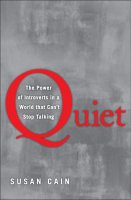 Quiet: The Power of Introverts in a World that Can't Stop Talking by Susan Cain (Crown, 2012)
Quiet: The Power of Introverts in a World that Can't Stop Talking by Susan Cain (Crown, 2012)
I waited a long time for my name to percolate to the top of our library's waiting list for Quiet. In another example of God's amazing sense of humor, I was able to pick up the book on my way home from dropping the Daleys at the airport. Returning to a house no longer ringing with the sound of grandchildren was at the time altogether too much quiet for me. Being able to bury myself in the book did help assuage the sense of loss, however.
I'm tempted to say that Quiet is by far the best of all the books I've read on introversion, though that may only be because it's the third, and I have the advantage of having read others. Introverts in the Church made me cry because it was the first, revealing to me the value of character traits I've been pressured to suppress all my life, but it is not particularly well written, and is a bit strident for sharing with extroverts.
Although I found the second book overly psycho-therapeutic, I learned from The Introvert Advantage some of the physical differences between the brains of introverts and those of extroverts, and some advice for understanding (and helping) both introverted and extroverted children. Quiet takes that ball and runs a lot further with it.
It helps that the book is well written, enabling me to concentrate on the content without being distracted by the form. The author is also more even-toned in her approach, highlighting the contributions of introverts, yes, but at the same time emphasizing the value of both temperament types. She's much easier on extroverts than some writers whose scars from growing up in an extrovert-dominated world are more visible. Nonetheless, I can't unequivocally recommend the book for all extroverts. If you're an insecure extrovert looking for affirmation of your own temperament, you won't find much help here. If you think the problem with the world is that most people are not extroverted enough, Cain is not singing your song. But if you yearn to understand, appreciate, and support the introverts in your life—especially if you have an introverted spouse or child who frustrates or puzzles you, or if you're an employer desiring to create the most productive work environment for employees of diverse temperaments, don't miss Quiet.
Cain deliberately broadens her use of the terms "extrovert" and "introvert" from the popular consideration of whether one is renewed by crowds or solitude.
This book is about introversion as seen from a cultural point of view. Its primary concern is the age-old dichotomy between the "man of action" and the "man of contemplation," and how we could improve the world if only there were a greater balance of power between the two types.
Actually, her brush is broader still, which to my mind makes it worthwhile reading "yet another book on introverts": She covers other, related personality traits, along with how they interact with intro- and extro-version. This could profitably have been seven books rather than one. Which is a bit frustrating, I'll admit, as it seems she is just getting started on an interesting subject when she veers in another direction.
Quiet is a popular book, which means I had only two-thirds the normal time to keep this library copy, with no hope of renewal, and it was due yesterday. So for the remainder of this post you'll get a somewhat random collection of a few of the points that caught my eye.
The 20th century was not a good time for introverted children. Reading about the development of the Cult of Personality and the psychological concept of the Inferiority Complex helps explain why I provoked comments in my father's journals (which I read many years later) on the order of, "I sure wish Linda were more sociable." Never mind that my parents were as introverted as I am—they wanted better for their children.
[C]hild guidance experts of the 1920's set about helping children to develop winning personalities. Until then, these professionals had worried mainly about sexually precocious girls and delinquent boys, but now psychologists, social workers, and doctors focused on the everyday child with the "maladjusted personality" ... The experts advised parents to socialize their children well and schools to change their emphasis from book-learning to "assisting and guiding the developing personality." Educators took up this mantle enthusiastically. ... Well-meaning parents of the midcentury agreed that quiet was unacceptable and gregariousness ideal for both girls and boys. Some discouraged their children from solitary and serious hobbies, like classical music, that could make them unpopular. They sent their kids to school at increasingly young ages, where the main assignment was learning to socialize. Introverted children were often singled out as problem cases.
Maybe I'd have been better off growing up in Taiwan, as in this quote from a present-day American high school student whose parents are from that country. (More)
I've been experimenting with Memrise for several days—long enough to conclude it merits a mention.
Memrise is a vocabulary review system that specializes in languages, of which there are an incredible number, from French to Quechua to Klingon! (Alas, no Swiss German, no doubt hampered by the lack of an official written form.) There are other subjects, as well, but not many yet, and they are not well developed. The Periodic Table course, for example, would do better not reversing the "o" and the "u" in fluorine, and settling on either of the two acceptable spellings of the element Al, instead of compromising with "Alumnium." (Or is that a new element, named after all college graduates?)
I'm loving the Introductory German! My favorite language course is still Pimsleur, which along with Hippo gets the correct sound and feel of the language and its structure into my brain. But I also need a way to build up vocabulary, and Memrise is the best I've found so far. The vehicle is a simple "garden" system: new words are seeds, and through practice you sprout them, help them grow, "harvest" (more like transplant) them to long-term memory, and water them to keep them healthy. E-mail reminders bring you back to your "garden" at varying intervals—short for recently-learned words, longer for ones you know better—so you don't lose what you've learned.
It's easy to use and kind of fun. I find that I'm picking up vocabulary pretty well so far, though I do wonder who decided which words to introduce first. I mean, die Bundesrepublik? "Federal Republic" is not exactly a term I use every day. Or how about der Mülleimer? Dustbin? Dustbin? Dustbins are things people in the English novels I love to read are always "tipping" things into, but I'm sure I've used the term fewer times than Federal Republic. And is blöd (stupid) really an essential vocabulary word? Still, in addition to these oddities there are more useful terms, such as das Haus (house), vielleicht (maybe), and der Name (name). And I've finally caught the difference between der Staat (state) and die Stadt (city).
Unfortunately, I can't make the audio work in Firefox, and so must use IE or Chrome if I want to hear the words pronounced. That's something I find very valuable, not only for understanding and speaking, but because having heard the sound of a noun I'm much more likely to be able to remember whether it's die, der, or das, something I always have trouble with. I'm beginning to think of the article and the word as one entity, which of course will get me into trouble when I have to worry about inflection, but I'll climb that hill when I get to it.
It's also German German, and so uses the Eszett instead of the Swiss double "s." However, it accepts the double "s" when I have to type in an answer, so I'm fine with it. Letters with an umlaut are easy to enter, via either a mouse click or the Windows U.S. International keyboard (which I prefer because it is faster).
Here's hoping I manage to stick with the program, and not lose everything when I go on vacation....
 Luke's Story by Tim LaHaye and Jerry B. Jenkins (Putnam Praise, 2009)
Luke's Story by Tim LaHaye and Jerry B. Jenkins (Putnam Praise, 2009)
Luke's Story, the second book of LaHaye and Jenkins' Jesus Chronicles, uses the Bible, extra-biblical sources, and a lot of imagination to tell a reasonably credible story about the author of the Gospel of Luke. I found it more interesting than Mark's Story, though it suffers from many of the same defects. It's still seems like cheating that the authors get so much of their word count by lifting passages straight from the Bible, and their denominational slant is annoying. Worse, it lacks a first-century feel. I'm not sure I'd recognize an authentic setting, but I know the characters are spouting modern language, theology, and attitudes. Somehow I doubt that first-century worship looked quite so much like a modern American Baptist service....
However, there's more "story" to this book than there was to Mark's Story, which made it more enjoyable to read.
 No, We Can't: Radical Islam, Militant Secularism, and the Myth of Coexistence by Robert Stearns (Chosen, 2011)
No, We Can't: Radical Islam, Militant Secularism, and the Myth of Coexistence by Robert Stearns (Chosen, 2011)
I received this book for review under false pretenses, but it was my fault entirely. This was the blurb that caught my eye:
The world is shifting, and a war for world domination is raging between radical Islam, militant secularism and Judeo-Christianity. But what does it mean for you—and why should you care? With clarity and astonishing depth, Robert Stearns lays out the dire ramifications of this coming culture clash for Christians. Based on years of global outreach, he shows what believers can and must do. The tipping point in global culture is upon us. What role will you play?
Normally, words like "a war for world domination" wouldn't encourage me to pick up a book. But I thought this would be a word from the trenches, from one known for his care for the poor, the downtrodden, and the marginalized all over the world. I was eager to hear about "radical Islam" from one whose organization has experienced tragedy at the hands of the Taliban, yet continues to provide humanitarian aid to "all people, regardless of religion, race, ethnicity, or gender." I was expecting "he shows what believers can and must do" to focus on the need for more church involvement in fighting the causes of poverty and injustice worldwide. I was hoping to hear about World Vision International's experiences dealing with culture clashes, and was especially interested to hear the warnings of such a man about "dire ramifications of this coming culture clash." I wanted to know what led such a man, who claims we have the knowledge and ability to end most extreme poverty if only we had the will, to write a book entitled, "No, We Can't."
My mistake was in not checking up on the author. It turns out that the president of World Vision is Richard Stearns, while the author of this book is Robert Stearns. As far as I know, they are not related, and they certainly have different perspectives.
Having agreed to review the book, however mistakenly, I was obligated to read it. It's a pity that Robert Stearns' language is so strident and his logic sometimes shaky, because I think he has some good points; it's just too hard to sort the wheat from the chaff. (More)
 Mark's Story by Tim LaHaye and Jerry B. Jenkins (Putnam Praise, 2007)
Mark's Story by Tim LaHaye and Jerry B. Jenkins (Putnam Praise, 2007)
This, the second story in The Jesus Chronicles, is a bold, not to say brazen, attempt to show the events of Jesus' life and of the early church through the eyes of the author of the Gospel of Mark. I hadn't planned to read anything more by LaHaye and Jenkins, not after my disappointment with their Left Behind series, which had an interesting premise but could have used writers who were as serious about the story they were crafting as they were about the message they wanted to get across. As I've said before, great writers manage to convey many messages through their works, but people who start writing with a message in mind tend to write mediocre novels. But Mark's Story was recommended by a friend whom I respect, and she backed up the recommendation by lending me the book.
Tackling any part of the the Bible though the medium of historical fiction is risky, and I wondered how LaHaye and Jenkins—who so clearly reverence the Book as the written, infallable, word of God—would dare to add to what the Scriptures have to say. Well, they were smarter than me, and solved that problem—not to mention the need to get their word count up to book size—by quoting passages of the New Testament verbatim, and at length. Mark's "story" is merely the lubricant that allows the quotations to slide together into a coherent narrative.
I must say that the authors have done a credible job of piecing together the Gospels, the book of Acts, and the letters of Paul and Peter, along with what we know of early church history, while adding only enough new material to make the story flow, to show how Mark might have learned the stories he tells in his Gospel, and to get across their own biases and interpretations. The last should surprise no one who has read the Left Behind books.
Unfortunately, that much of the material is straight Scripture I actually found to be a detraction. I'd rather read the Bible itself, because—at least to someone very familiar with the facts—what is added did not give enough story to the narrative. I wasn't eager to turn the page to find out what was going to happen, and the book has none of the character development that makes me happy to re-read books I know almost by heart.
For someone less familiar with the New Testament, however, this might be a good introduction. As I said, the authors succeeded in weaving a chronological tapestry from writings that are anything but chronological. And despite my complaints, I may go ahead and read the rest of the series, just to see what they can do with the other Gospel writers. If I think of Mark's Story as one of those modern "specialty Bibles" with denominational commentary, it "works" better for me.
 Wonderful Fool by Shusaku Endo, translated by Peter Owen (Tuttle Publishing, 1974; originally published in 1959)
Wonderful Fool by Shusaku Endo, translated by Peter Owen (Tuttle Publishing, 1974; originally published in 1959)
I am currently on a schedule of reading one Shusaku Endo book per Swiss grandchild born. I'm definitely warming to his writing, so perhaps I should visit Switzerland more often.
This thoughtful exploration of what might happen when innocence and love meet everyday society, though less depressing than most of the stories in Stained Glass Elegies, is hardly the "light, humorous novel" promised in the Introduction. It is, however, uplifting and redemptive. It is also well written, for which credit no doubt goes to both the author and the translator. I especially enjoy the vision of Japan through Japanese eyes, and the small advantage our brief visit to that country has given me. The one part of the translation that strikes me as odd when I read it is the persistent use of the appellation "foreigner" in a way it would not be used in English. Yet when I imagine the speakers saying "gaijin" instead, the language flows and the usage makes sense.
The summary on the back cover is excellent, so rather than reinvent an inferior wheel, here it is:
Wonderful Fool is Shusaku Endo's gentle and humorous narrative of "mudswamp Japan"—his phrase for the Japanese inner world of moral apathy and insensitivity to God and sin. A young Frenchman, Gaston Bonaparte, comes to Japan for the first time, and we see Japan afresh through his eyes. At first he seems to be the utter fool both in his ugly horseface appearance and slow-witted thought, but he gradually charms those around him as he bumbles through Japanese society, making mistake after mistake. In spite of his mistakes, those around him start to see some endearing qualities in his pure love of both people and animals. Gaston's wanderings take him to the seamier places in Japan, as he spends time in Sanya with day laborers, in Shibuya with fortune tellers, in Shinjuku with prostitutes, and eventually hooks up with a professional killer. His two young hosts, Takamori and his sister Tomoe, are drawn into Gaston's world and forced to take a deeper look at their own lives and values. Both a provocative tale of clashing culture and new-found morals, Wonderful Fool also serves as a kind of guidebook to a hidden Tokyo and Japan that few foreigners may have a chance to experience.

The Stories of Emmy: A Girl Like Heidi by Doris Smith Naundorf (Xulon Press, 2010)
Doris Smith Naundorf is known in upstate New York as The Story Lady. The Stories of Emmy are taken from her one-woman play, Interweaving the Generations. Emmy, Doris's mother, grew up partly in her Swiss village of Muttenz, and partly in Paterson, New Jersey, where her family moved when she was ten years old. Her stories give a delightful glimpse into Swiss, American, and immigrant life in the early 1900's. (Grandchild warning: There is one sad incident requiring parental discretion; the stories are meant to be appropriate for chidren, but reality is sometimes harsh.)
Muttenz is near Basel (four minutes by train, a century later), and the stories are sprinkled with Baseldeutsch, the delightful Swiss-German dialect spoken there. A glossary is provided for each chapter.
Driving the several blocks to the train station, Emmy excitedly chattered to her father. "Will we get there in time, Vatti? she asked. "Mutti says we must be there early, so we will not miss the train."
"Jo, jo," replied her father. "In a country that makes such fine watches and clocks, of course the Zúúg runs on time. It is up to the passengers to be there early so the conductors can keep their schedule."
"The Zúúg, the train, is never late?"
"Of course not! We Swiss cannot even imagine such a thing!" her father assured Emmy.
I couldn't resist finding Emmy, age 20, and her family in the 1920 census. (Click on the image to view a version large enough to read. Their name, Lüscher, appears without its umlaut.)
JoAnn Falletta, conductor
Elmar Oliveira, violin
John Callahan: Pulsar (World Premiere)
Saint-Saëns: Violin Concerto No. 3 in B minor, op.61
Prokofiev: Symphony No. 5
Last night's Orlando Phil concert, the final for the season in our series (Classics), was certainly enjoyable, but through no fault of the excellent conductor, soloists, and orchestra, it came across, for me, as a little bland. Listening to music performed cannot compare with making music oneself, and no mere concert can hope to compete with the experience of being part of a grand event, like the afternoon's Consecration of the Rev. Gregory O. Brewer as Fourth Bishop of Central Florida. About that I will write much more, but I'm waiting for the complete service to be uploaded to YouTube. (Part 1 available now, if you want a preview, but most if not all of my readers will appreciate the effort I'm making to provide a guide to the very long service.)
A post about the OPO concert is in order, however, in order to say this: Remember the name, John Callahan. He's a piano student at Florida State University, and won the OPO's Young Composers Challenge in 2008 and 2009. Pulsar was commissioned for the OPO by local musician and philanthropist Stephen Goldman, founder of the Young Composers Challenge. I can't say that Pulsar made my heart sing the way the music of John Dupuis does, but even I can tell that Callahan is extremely talented and composes at another level altogether.



